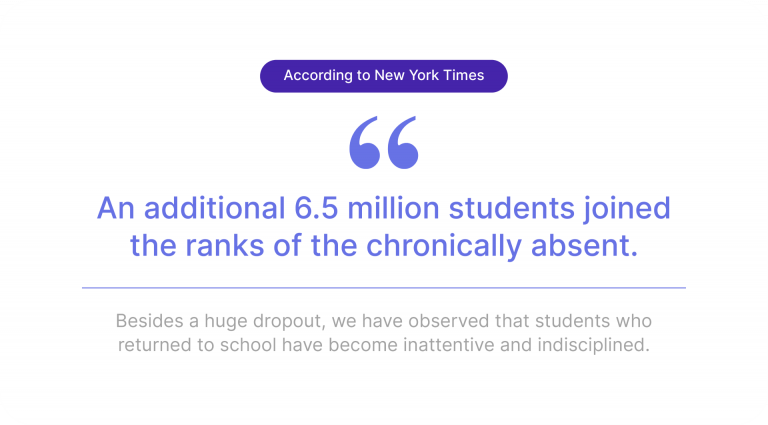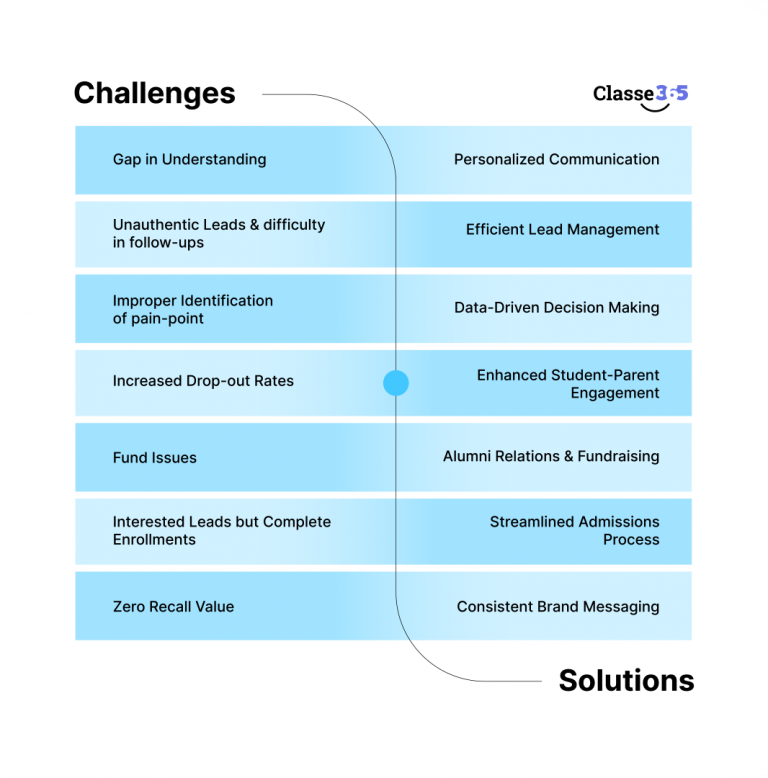Do you notice a rapid decrease in your institution’s
enrollments or are you not growing the way you want to? Let us tell you that
you’re not the only one. Educational institutions have endured a lot of
challenges during the pandemic. Renowned institutions have observed a
decreasing enrolment and a downfall in fundraising programs. Not only at the
K-12 level, this drastic change has affected higher-ed, universities and academies.
According to the New York Times, “An additional 6.5 million students joined the ranks of the chronically absent.” Besides a huge dropout, we have observed that students who returned to school have become inattentive and indisciplined.

Institutions have managed unique solutions to solve these issues and grow at their best potential. If you want to know what clicked for them, you are at the right place. Get a sneak peek at some winning strategies and learn how to manage educational institutions.
Secret 1: Personalized Communication
Communication is the key to success for any business. The more personalized your communication is, the more customers you attract. Successful institutions around you are no exception. They create a recall value through constant connections with potential students, present students, and alumni. Not only that but their messaging tone and address also make everyone feel exclusive.
Do you wonder how it’s possible? Let us reveal the secret here. Every institution that scaled up its enrolments by 80% in the last three years uses a school management system (SMS). An education management system promises a 360-degree solution to your institution with SIS (Student Information System), LMS (Learning Management System), and CRM (Customer Relationship Management). You can automate your 90% manual tasks and easily focus on networking, fundraising, attending to customers, and successful enrolments. With the right SMS, schools can craft personalized messages that resonate with each individual by analyzing data on prospective students’ interests, behavior, and engagement history.
Learn more about the process with an instance:
An institution can use CRM data to identify students interested in STEM programs and send targeted emails highlighting their state-of-the-art science labs, successful alumni, and upcoming STEM-related events. Personalized communication helps build a strong connection with prospective students, making them more likely to choose the institution.
Secret 2: Efficient Lead Management
Getting authentic leads and converting them into your customers takes a lot of effort while doing it manually besides handling thousands of other administrative jobs. Therefore, institutions seeking smooth growth use CRM systems to streamline the lead management process by tracking and organizing interactions with potential students. This ensures that every lead is taken care of and allows schools to prioritize follow-ups based on the prospect’s level of interest and engagement.
Learn more about the process with an instance:
When a prospective student downloads a brochure or attends an open house, the CRM system records these actions. Admissions teams can follow up with personalized messages, additional information, or invitations to campus events, nurturing the lead through the enrollment funnel. Efficient lead management helps schools maintain a steady flow of prospective students and improves conversion rates.
Secret 3: Data-Driven Decision Making
Compiling student data, arranging a seamless admission process, and handling billing and invoicing take a toll on the administrative staff and educators. Besides, not keeping a thorough note of academic progress, attendance, and behavioral data affects the institution’s performance. As a result, the institution struggles with strategic planning, lacks visibility, and ultimately hinders its overall institutional development by failing to attract potential students.
Data is crucial for any institution’s success, especially in strategic planning and growth,” says Javier Barragan, CEO of Franchise Clues. “At Franchise Clues, we’ve seen firsthand how data-driven insights improve decision-making, streamline processes, and boost adaptability. For instance, our partner saw a 25% increase in member retention within the first year of implementing data-focused strategies, optimizing operations, and enhancing visibility. Educational institutions can achieve similar results by using data to personalize student interactions, monitor academic progress, and make strategic adjustments. Leveraging technology and digitalization, such as virtual learning options and performance-tracking tools, allows institutions to broaden their reach and engagement. Embracing data-driven decision-making and digital tools can significantly increase student engagement and support sustainable growth, much like the success we’ve seen in the fitness industry
Successful institutions rely on a School Management System (SMS) to drive data-driven decisions with insights into student performance, teacher effectiveness, and administrative efficiency. Schools can tailor interventions and create personalized learning plans by analyzing academic progress, attendance, and behavioral data. The SMS, also, evaluates teacher performance, supports professional development, and streamlines resource allocation and financial management. Enhanced communication through the system improves parent and student engagement, while data-driven insights inform strategic planning and policy decisions. This integrated approach ensures educational institutions operate efficiently, enhance student outcomes, and make informed, strategic decisions.
However, a school management system that maintains a unified learners’ journey approach is rare. Only, Classe365 offers you that facility; everything you need to know about your student is under one umbrella, assembled in one place.
Learn more about the process with an instance:
Suppose a special teaching method has become famous in some other institution and students are benefitting from that. Institutions that are out of any technology’s touch will of course stay behind the trend and eventually lose students. Not only that, they will also not succeed in attracting potential students.

Secret 4: Enhanced Student-Parent Engagement
Many schools struggle with parent and student engagement, a challenge exacerbated during COVID-19 due to inadequate technical support. Schools often lose connection with students and face difficulties engaging parents, who may lose confidence in the institution if they stop receiving updates about their child’s progress. Regular communication is crucial, including both face-to-face and virtual parent-teacher meetings, to address students needing extra support in specific subjects.
A School Management System (SMS) simplifies this process by consolidating all relevant data in one place. It enables educators to provide data-driven insights to parents, ensuring everyone stays informed and aligned. By tracking student progress and facilitating timely interventions, the SMS helps maintain strong connections between teachers, students, and parents, enhancing overall engagement and support.
Learn more about the process with an instance:
A CRM (Customer Relationship Management), a part of an SMS system can send automated birthday greetings, reminders about important deadlines, and personalized messages based on students’ interests and activities. This continuous engagement helps students feel connected to the institution, reducing dropout rates and enhancing overall satisfaction.
Secret 5: Alumni Relations and Fundraising
The World Economic Forum highlights the importance of maintaining strong relationships with alumni. Students who graduate from your institution carry a reputation for life, and their word-of-mouth significantly impacts your institution’s credibility. Their successes contribute to your institution’s achievements, making it crucial to maintain an inseparable bond with them. Staying updated on their accomplishments and promoting them on your official social media pages strengthens this connection. Additionally, providing alumni with career guidance and job opportunities introduces your institution to industry experts, who may then rely on your institution for new talent.
CRM systems have a pivotal role in nurturing these relationships by facilitating effective communication and engagement. They enable institutions to connect with alumni, who can become valuable advocates, mentors, and donors, thereby enhancing the institution’s network and influence.
Learn more about the process with an instance:
A CRM system can segment alumni based on graduation year, career field, and engagement level. Schools can then tailor their communications to each segment, providing relevant updates, event invitations, and fundraising appeals. Effective alumni relations contribute to the institution’s growth and reputation, creating a supportive community of advocates and benefactors.
Secret 6: Streamlined Admissions Process
A successful administrator always goes for a smooth admission process. Attracting correct leads and converting them into customers is an achievement. The cycle completes with a seamless admission process.
An SIS simplifies this process by automating routine tasks, tracking application statuses, and providing a centralized platform for all admissions-related activities.
Learn more about the process with an instance:
Applicants can receive automated updates on their application status, reducing the need for manual follow-ups. Admissions staff can access all relevant information in one place, enabling them to make informed decisions quickly. A streamlined admissions process enhances the applicant experience and improves the institution’s efficiency.
Secret 7: Consistent Brand Messaging
Educational institutions have long been uninterested in education
marketing and branding until they realized what they could achieve with a
successful marketing strategy. Even the greatest of institutions make an effort
to make them visible on the public platform. Consistency in branding and
messaging is crucial for building a strong identity. CRM systems ensure that
all communications align with the institution’s brand guidelines, providing a
unified voice across all channels.
Learn more about the process with an instance:
Templates and automated workflows can be used to ensure that
emails, social media posts, and other communications reflect the school’s
branding. Consistent brand messaging helps to build a recognizable and
trustworthy image, attracting prospective students and reinforcing the
institution’s values.
Now, you can understand how a School Management System
enhances an institution’s growth in a few months. However, a comprehensive SMS
that can accommodate K-12, higher-ed, universities, and academies of any scale
is rare. Also, most School Management Systems provide limited services. Either
you get a combination of LMS and SIS or only SIS. If you are looking for a
complete offering of SIS, LMS, and CRM, have a tour of Classe365.
